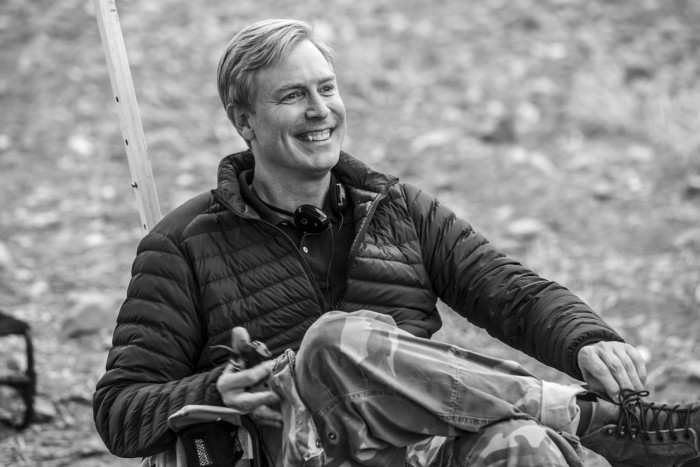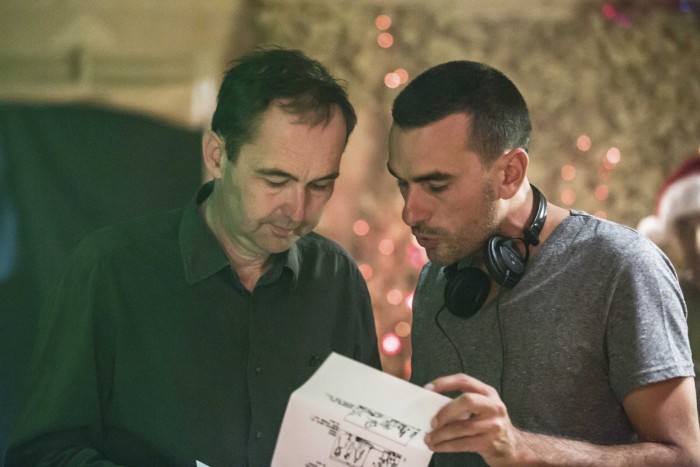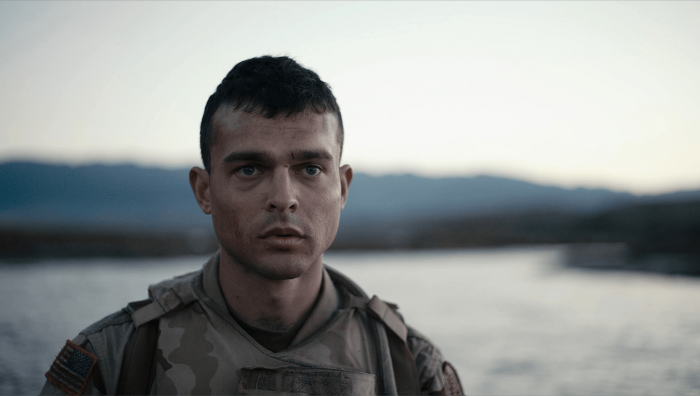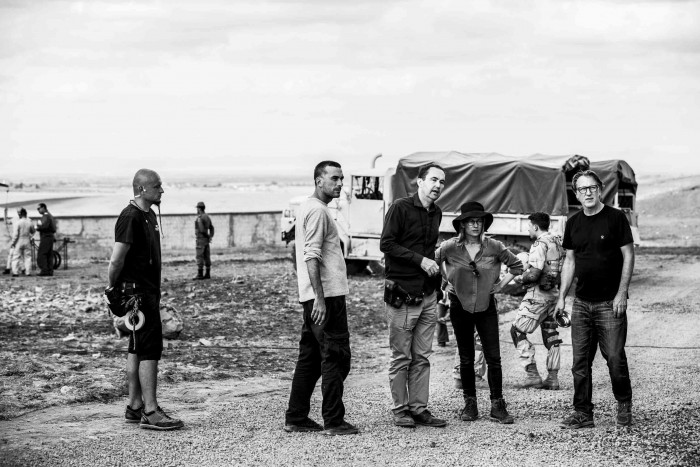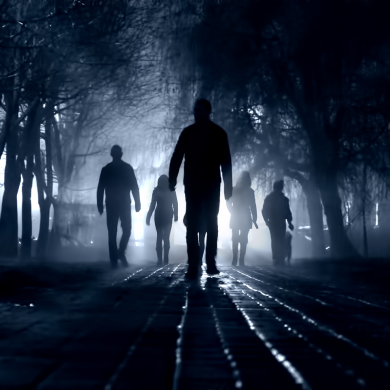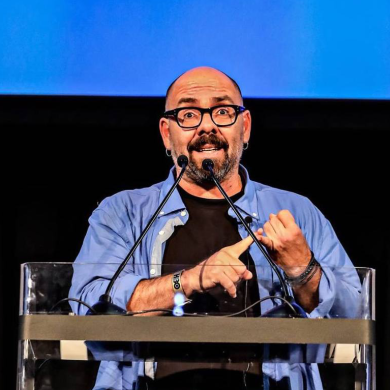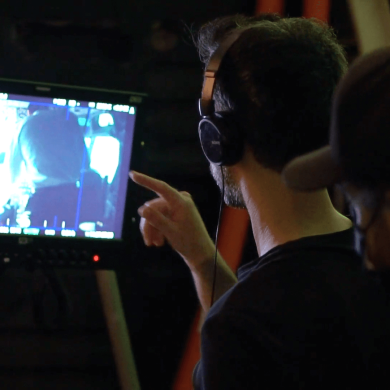By: Gregg LaGambina
First in the series.
It’s not uncommon to sit back, get comfortable, and watch a film’s opening credits and wonder aloud, “What does a producer do? And why are there so many?” At CreativeFuture, we thought the easiest way to find out was to just ask one of them. Jeff Sharp has been an independent film producer for nearly 20 years. As the President and CEO of Sharp Independent Pictures, he has produced landmark independent films such as Boys Don’t Cry and You Can Count On Me. Earlier today, his film, The Yellow Birds, premiered at the Sundance Film Festival.
Based on the debut novel by Iraq War combat veteran Kevin Powers, The Yellow Birds is directed by Alexandre Moors (Blue Caprice) and stars Alden Ehrenreich, Tye Sheridan, Jennifer Aniston, Toni Collette, Jack Huston and Jason Patric. With a cast like that – and a subject matter as urgent as an ongoing war halfway across the globe – one might think Sharp will sail into Sundance full of confidence. But he knows better, because he is an independent film producer.
On the eve of the premiere, CreativeFuture sat down with Jeff Sharp to talk about what it means to be an independent film producer, how much the industry has changed since he went to Sundance with You Can Count On Me, and why his own mother never believed he had a job – any job – at all.
Gregg LaGambina: No one really knows what a film producer does.
Jeff Sharp: [Laughs] I know. Including my own mother!
GL: You’re a producer – with Courtney Solomon and Mark Canton of Cinelou Films – on the forthcoming film The Yellow Birds. So, why don’t we talk about that particular film, what it means to be a producer heading to the Sundance Film Festival with a new movie, and somewhere along the way, maybe we will explain what an independent film producer does?
JS: If we wanted to focus it very specifically on one aspect of the producer’s job, on this film, I was there from the very beginning to, as you mentioned, Sundance, and on through to the film’s ultimate release. That’s quite a span and that covers a lot of territory. One place I can speak to with some authority is the development process. Development is consistently underappreciated in the marketplace.
GL: What exactly does “development” mean?
JS: I’ve always been a huge proponent of looking for underlying IP [intellectual property] – or great source material – as the basis for features and TV. You mentioned that you’ve read the book [The Yellow Birds, a novel by Kevin Powers]. It’s such a beautiful book, right? I’m a big reader, always have been, and Kevin’s lyrical storytelling powers just painted itself as something cinematic.
Over the years, I’ve forged different partnerships and relationships with authors, agents, and publishers. Many of the best films made from underlying IP and books tend to be those where there is a strong producer involved who is overseeing the creative process. In the case of The Yellow Birds, it was an incredibly well-reviewed book, it was a finalist for the National Book Award, Kevin was really celebrated for his work, and the book was successful commercially. In order to mount an option and an offer to get the attention of the agent who represents the author, it does take a producer who knows how to raise money in order to finance the option, and who has an appreciation for the screenwriting process.
GL: Is there a lot of competition from other producers when the source material is as recognized and coveted as The Yellow Birds?
JS: Yes. It’s also highly speculative. It’s probably the most speculative part of the whole process. Production is the part of the process that draws in the most in terms of financing, then, of course, the release and distribution, but development – on the page – doesn’t look like a lot of money. However, in fact, it’s the riskiest money going in, because I don’t know what the odds of a screenplay actually getting produced and made into a film are, but I would think it is probably less than 10 percent.
That’s where an experienced producer can step in, because a producer with a track record – or a real passion for a book – can go to the agent and say, “Look, we’ve done this before. We understand that this is a commercial transaction.” The author and the agent need an offer. It’s not just that we’re excited about turning this into a movie; they actually need an offer they can take to their client. So, it does require, I think, a combination of skill sets, possible reputation in the business, and some financing – or the ability to finance that process. So, that’s kind of the critical mass that’s necessary early on in producing a film based on a book.
GL: How did you convince Kevin Powers, or his agent, to trust you with the material enough to turn it into a feature film?
JS: In the case with Yellow Birds, we were super fortunate. I was producing for a company called Story Mining & Supply that was very focused on development. Those resources were available to option the book and hire the screenwriter, who, in this case, is David Lowery [writer and director, Ain’t Them Bodies Saints]. That process – the optioning of the book alone – took six months. It was a highly competitive situation. There were other producers who were interested in optioning the material. Ultimately, his agent who is a pro – Rich Green – deferred to Kevin and his sensibility in terms of what producer he thought would actually come up with the version of the film that he would be most comfortable with. It’s not just a financial consideration. While that’s important, it’s also about, “Who do you trust with your story?”
GL: Once you obtained the rights to the story, how long did it take to get a screenplay written based on the novel?
JS: Six months was just the process of optioning the rights. That was a little bit like pins and needles there. You want to sell your ability to get a movie made, but you don’t want to oversell it because God forbid it doesn’t happen and then you’re like, “Oh, sorry!” And I’ve been there too. But after we closed on the rights, it was a fairly swift process. David Lowery had just burst on the scene with Ain’t Them Bodies Saints. He had a pretty full dance card, but it was a great alignment – he had time to read the book, he responded to the material in a hugely visceral way, and he said he had always wanted to make a war movie. This was a story that really spoke to him. David just happens to be one of those amazing, once-in-a-lifetime gifted screenwriters who just goes off and writes it. And, on the first draft, he nailed it. He delivered a draft that is very close to the draft that we ended up shooting. That part was rather swift.
From there, with a combination of the script and the notoriety of the book, we were able to reach out to actors and the movie happened. I’m not looking at a calendar, but I want to say that from script to production, we’re looking at a period of 18 to 20 months. That’s actually not so long for this game! [Laughs]
GL: Some authors don’t care about the film versions of their novels. There is the writing and then there is the film – two different things and sometimes the author famously never participates in the filming of their own stories. They just sell the rights and keep on writing fiction.
JS: It’s interesting that you bring that up, because Kevin is a little bit of both. I think in the book – you’ve read it – it’s a novel, it’s fiction, but it’s heavily informed by his own experiences in Iraq.
GL: If I remember correctly, Kevin Powers came back from his tours in Iraq and earned an MFA at the University of Texas, Austin for creative writing. That would imply he is serious about writing fiction, beyond just his combat experience.
JS: That’s right. I think it would be hard to imagine – Kevin would have to say this himself, but I think this is a hugely personal work for him. There was a lot of consideration in terms of who he was going to hand it over to. But once he had made up his mind, then he was very hands-off and didn’t really want to know much about anything until we were there and in production and it became tangible for him. He was able to come visit us on the set and get to know the cast, some of the actors, and hang out with the director, and really get a sense of how his story was coming to life as a movie.
GL: Was he actively involved during the shooting of his novel – or was he mostly on set because he was just curious about how his story was going to look on screen?
JS: I think for Kevin, it depends. I’ve produced films where the author became an executive producer and adapted their own work and have a screenwriting credit and was on the set every day. That can be a pretty great resource, especially for a lower budget film, to have the author and screenwriter there on set. In the past, working with Armistead Maupin (The Night Listener), Michael Cunningham (A Home at the End of the World), Susan Minot (Evening) – that can be amazing. But at the same time, I totally respect and honor the fact if an author doesn’t want to be there during that part of the process. But I’m really happy that Kevin did come back into the process at the end when we were shooting. He was personally able to see how appreciative the actors were for his work, especially Alden Ehrenreich and the guys who were playing these young men. There’s something about Kevin’s work and the way that he writes about Murph [Tye Sheridan] and Bartle [Alden Ehrenreich] that shows his unique understanding about how these young men are feeling and I think, ultimately, that’s what the actors related to so deeply.
GL: Arguably, your big breakthrough as a producer was with the film Boys Don’t Cry. That’s a film from the late 1990s that, to me, is emblematic of a time when indie film ranked alongside any other genre as a money-making venture. Most of the major studios had boutique indie imprints and independent film was an economic force. What’s the difference between going around the festival circuit with a film like that in 1999, as opposed to January of 2017, heading to the Sundance Film Festival with The Yellow Birds? What are some notable differences between then and now, as an independent film producer?
JS: The wonderful thing about that time, when we were putting those early movies together – Boys Don’t Cry, You Can Count On Me, Lift – they were two- to three-million-dollar indie features that we financed with private equity, or a mixture of private equity and international sales. In a couple of cases, we brought in one of those mini-majors that you mentioned. But for the most part, we were free to really develop the script within our own creative bubble, without any studio notes. We were able to cast quite freely – casting the best possible actor for the part, and oftentimes that meant casting an unknown. Hillary Swank wasn’t an unknown; by the time of Boys Don’t Cry, she had done other work, but she was still a bold choice to play the lead in that film. You can look at You Can Count On Me and Mark Ruffalo – it was Mark’s first movie. And, of course, launching Kerry Washington’s career with her first starring role in Lift.
It wasn’t that we were showing them to a studio and running numbers. Of course, that’s all changed now. It doesn’t mean that the product is any less genuine or inspired, it just takes a bit of the spontaneity out of it, I think. By spontaneity, I mean it adds time to the process. You’re rather limited in terms of whom you can cast for certain roles in films. I’m talking about even smaller films. I just produced a film called UFO, which is a smaller film, and still, it was important that we create a film that had commercial appeal, internationally. So you’re casting and reaching out to established actors you hope are going to respond to the material. Then, their schedules are very complex and complicated because they’re in great demand, not to mention the pressure it puts on the film’s budget. I think the timeline it takes to package a film – and “package” wasn’t even a term I understood back then, in the early days. I think it extends the process considerably nowadays. At the end of the day, are the films better or worse? I don’t think it takes away from the ability to make great movies, it just adds to the complexity of getting movies made and I think it adds complexity to putting the financing together, ultimately.
GL: On the one hand, there is the ongoing problem of piracy, which affects mid-budget movies the most, because if the money can’t be recouped, the investment risk is even higher on a smaller film. But at the same time, there couldn’t be a better time to be an independent filmmaker: you can make a movie, edit it, score it, release it, and have it seen anywhere around the world in an instant. However, much of the financing for smaller films comes from pre-selling international rights to make the movie in the first place. Have new technologies made your job more difficult, more easy, or both?
JS: I think you just totally touched on it. It’s a bit of both. I think we’re at a moment where those legacy business models, the international sales business model, is still viable. And the markets – Cannes, Berlin, American Film Market – are still resilient and able to function. While there’s been real consolidation in that industry, there are still some incredibly versatile and knowledgeable film sales agents and companies that are extremely valuable in putting films together – because they understand their territories better than anyone. They’ve spent their entire careers in Germany, France, the U.K. – they understand their markets in a way that really help creatively inform the process. That remains a valuable mainstay to the industry. At the same time, we have this influx of capital and acquisitions from places like Amazon Studios and Netflix and that’s so exciting to think that a film like The Yellow Birds – or a film that ambitious – will reach the widest possible audience, potentially. It just depends on how it all plays out.
GL: We just have to convince people not to use that same technology to steal other people’s creative work.
JS: That’s right! And we need to be more expeditious in getting our work out there to our audience with an immediacy that hasn’t been possible in the past. You mentioned Boys Don’t Cry. I’m from Columbus, Ohio. When that film was first released, it just never got to my hometown’s local multiplex. So, not only did my mother not understand what a producer did, she didn’t even think my movies were real because they didn’t play in our movie theater! [Laughs] She was like, “What’s going on here?”
So, the opportunity to have your work on these new platforms and to be seen by that kind of audience is great. In my publishing experience – I was president of Open Road Integrated Media, the eBook publishing company that I co-founded with Jane Friedman – I had the experience of working with Amazon as a publisher. And if you are promoting an eBook – and our business model at Open Road was promoting backlist titles – older books by William Styron like Sophie’s Choice or Michael Chabon’s Mysteries of Pittsburgh – books that were no longer on the front bookshelves of Barnes & Noble, those things, if they get promoted as part of an Amazon promotion – “Summer Reading” or “Holiday Picks” – they just blew out the door. It’s this huge, huge windfall for the author and for the publisher.
GL: How is seeing that firsthand as a publisher and now starting to see the potential with what Amazon can do with features and television?
JS: It’s the early days, but it’s potentially very exciting. And Netflix – of course, they have their own unique business model, but the potential that these platforms have not only to create excitement and to market and promote the film, it’s exciting and we’ve started to see the impact at Sundance and some of the other independent film festivals and markets around the world. I think we’re in a fortunate period of time. As independent producers, it’s exactly what you said – we’re in this kind of hybrid, bifurcated business model where you have traditional modes of financing and packaging films living alongside each other. In a perfect world, those two models coexist. Or, perhaps there’s a collaboration that ultimately unfolds and is unfolding.
GL: There is an argument out there that if filmmakers can better meet the consumer’s needs, the consumer is more likely to pay for the content if they can enjoy it when and where they please.
JS: Yeah, there seems to be an argument for that. I mean, I hang out with film people a lot – so I’m not sure how popular some of these new platforms are – but there are these really cool curated sites that are emerging and I hope those start to really attract larger audiences. Things like Fandor, Mubi, FilmStruck – they have their own unique, niche audiences and films now have multiple windows where they can reach viewers.
GL: You brought You Can Count On Me to Sundance in 2000 and now you’re bringing The Yellow Birds in 2017. How do you feel right now, being at the festival with a brand new film to premiere?
JS: The first time around I think everything is just brand new and it’s just amazing to see your film playing for an audience that’s so appreciative and leaning into your work in that way that only happens at Sundance and no place else. In the case of You Can Count On Me, that was just such a head spinner. My mother had died right before the film’s premiere at Sundance and Kenny Lonergan graciously allowed me to dedicate the film to her. The film’s reception was a slow build but by the time the festival ended, it won the Audience Award and Screenwriting Award, Ruth Vitale and David Dinerstein acquired it for Paramount Classics, and it eventually went on to receive two Oscar nominations.
And that very same week, Hilary Swank won Best Actress at the Golden Globes for Boys Don’t Cry. Talk about highs and lows. But, I think going back with The Yellow Birds – you really do begin to appreciate the community and the support network that the festival offers filmmakers and the films. The Sundance Institute and the labs and the festival and Robert Redford himself, personally, have all played a major role in my career over the years. I have premiered four films at the festival and two of those films came directly out of the lab. There comes a time too, when you’re able to pass it on.
In this case, with The Yellow Birds, it’s going to be a thrill to watch some of our younger actors receive the recognition that I think they so richly deserve. Alden Ehrenreich, Tye Sheridan – these guys are so awesome. It will be fun to watch them experience the festival, while we’re sitting in the back, hiding behind the bushes at the Eccles Theatre.

